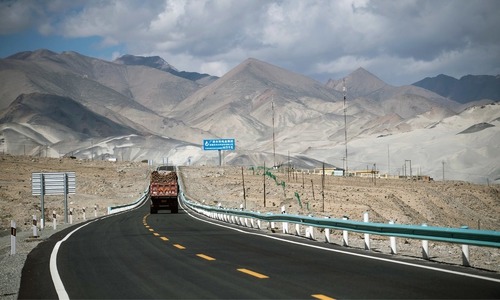The lack of adequate information on the outcome of the crucial 7th Joint Cooperation Committee (JCC) on China Pakistan Economic Corridor (CPEC) held in Islamabad last month has triggered speculations about the future of a number of proposed large transport and infrastructure projects.
The way details of the negotiations between the two countries on the future shape of bilateral cooperation around the Corridor initiative has trickled out has led many to conclude that China is probably backing out of its earlier commitments to finance and implement schemes direly needed by Pakistan.
The delays, for example, in the finalisation of the plan to upgrade Peshawar-Karachi railway line (ML1 or Main Line 1) and (Chinese) financing for three road development projects have widely been construed as ‘major setbacks’ for bilateral economic and financial collaboration around the trade route that will connect Western China with the Middle East, Africa and Europe via Gwadar port.
Pakistan’s rejection of the Chinese conditions for constructing the Diamer-Bhasha hydropower project and Beijing’s request to use yuan as ‘official currency’ in Gwadar further ‘strengthened’ this perception.
But does the ‘development’ on these projects — or lack of it — signify a setback for the future of economic cooperation between Beijing and Islamabad? Or does it merely represent operational hiccups as the Corridor project moves into a new phase?
With little information flowing out of the JCC meeting, according to Hasaan Khawar, a researcher who has done extensive work on the Corridor initiative, the interpretation of its ‘outcomes revealed so far’ can be very subjective in nature.
He is of the view that the agreement on framework for future bilateral cooperation under the Long Term Plan (2014-2030) in the spheres of industry, agriculture, tourism and finance is a major breakthrough. “Now the cooperation between the two countries is going to move beyond connectivity and energy projects.”
He also does not agree with suggestions that the delays in road development and railway line up-gradation projects meant a reduction in China’s interests in them. “I don’t think that China is backing out (as some commentators have since suggested).”
Beijing is just trying to be a little cautious because of (volatile) political conditions here, pausing for a moment as CPEC enters its next phase. Moreover, it does not have unlimited funds and would want to invest in projects and places where it can get better results.
China is probably focusing on implementation of the projects that are already in the pipeline rather than adding more to the wish list.
The total size of CPEC-related investments is said to have crossed $30bn with the overall commitments exceeding $60bn. Apart from some road projects, all other projects are being financed by commercial and concessional Chinese loans. But the government is yet to come clean on the break-up of the Chinese investment pledges in terms of financial arrangements — debt, investment, grants, etc.
Last week the IMF was reported to have conveyed to Islamabad that repayments on account of CPEC-related investments will peak after seven years and reach $3.5bn to $4.5bn a year. The IMF estimates the CPEC-related outflow’s impact on Pakistan to grow from 0.1pc in 2019 to 1.6pc of GDP (gross domestic product) a year by 2024.
Background telephonic interviews with two senior officials at the Planning Commission of Pakistan show that the government is not worried about the delays in the rail and road projects.
Does the ‘development’ on these projects — or lack of it — signify a setback for the future of economic cooperation between Beijing and Islamabad?
“Let me clarify one thing. It wasn’t China that backed out of $14bn Diamer-Bhasha hydropower project. Islamabad pulled out of the deal because of the conditions involved. That is not a setback at all. We are still negotiating the dam outside CPEC but personally I don’t think any Chinese firm will take it unless we agree to their conditions,” one of the two officials explains.
“As far as railway projects are concerned we need to work more on their feasibility. It is incorrect to assume that China has lost its interest in those projects. We just need to work more on different technical and financial aspects before we take these up with the Chinese authorities on balanced terms. You must remember that large projects like $8.2bn ML1 take years before these enter the execution stage.”
The other official argues that the ‘setbacks’ to CPEC as referred by some commentators are no more than operational hiccups and manifestation of an “evolving relationship between the two countries around the Corridor project”.
“Instead of letting early harvest projects set a time benchmark for future investments, we should now focus on commercial sustainability of the projects in the pipeline. We don’t want to go for a commercially unviable project only because it looks good.”
In his opinion, it is time for both the countries to “get out of the project mode and implement the long-term plan to deepen economic partnership. If Pakistan wants to benefit from this new trade route, we should use this connectivity for enhanced bilateral cooperation in industrial and agriculture sectors for transfer of technology and knowledge.”
Published in Dawn, The Business and Finance Weekly, December 11th, 2017














































